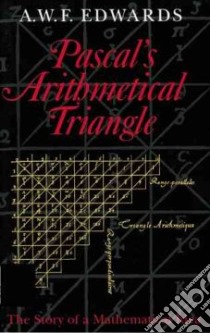Pascal's Arithmetical Triangle - 9780801869464
Un libro in lingua di Edwards A. W. F. edito da Johns Hopkins Univ Pr, 2002
- € 25.30
- Il prezzo è variabile in funzione del cambio della valuta d’origine
Imagine having some marbles, pebbles, or other objects that you want to lay out in a neat triangular pattern. How many do you need to end up with a complete triangle? Three will do; so will 6, 10, 15, and... These numbers are called triangular numbers. Ask the same question for a triangular pyramid. Four will do; so will 10, 20, 35, and... the so-called pyramidal numbers. This book looks at the discovery of the multiplicity of properties and uses triangular numbers and their many extensions possess.
Although often displayed in a triangular array named after the seventeenth-century French philosopher Blaise Pascal, triangular numbers were known many centuries earlier. In this book A.W.F. Edwards traces the Arithmetical Triangle back to its roots in Pythagorean arithmetic, Hindu combinatorics, and Arabic algebra, and gives an account of the progressive solution of combinatorial problems from the earliest recorded examples to the work of Renaissance and later mathematicians. He shows how Pascal's work -- so modern in style -- in establishing the properties of the numbers and their application in various fields led to Newton's discovery of the binomial theorem for fractional and negative indices and to Leibniz's discovery of calculus.
Informazioni bibliografiche
- Titolo del Libro in lingua: Pascal's Arithmetical Triangle
- Sottotitolo: The Story of a Mathematical Idea
- Lingua: English
- Autore: Edwards A. W. F.
- Editore: Johns Hopkins Univ Pr
- Collana: Johns Hopkins Univ Pr (Paperback)
- Data di Pubblicazione: 23 Gennaio '02
- Genere: MATHEMATICS
- Argomento: Pascal's triangle
- Pagine: 202
- Dimensioni mm: 241 x 158 x 19
- ISBN-10: 0801869463
- EAN-13: 9780801869464


